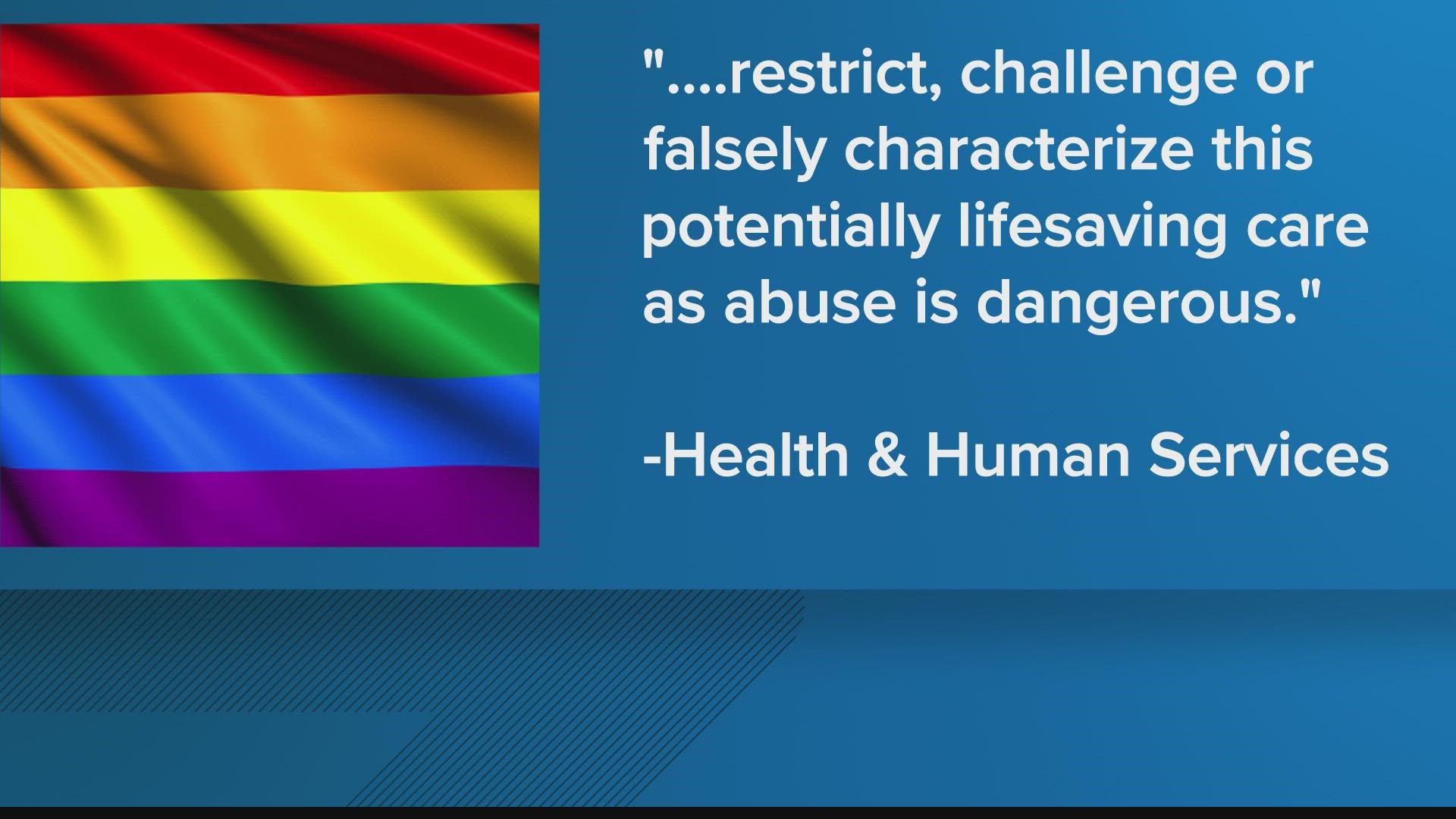JACKSONVILLE, Fla. — The Florida Department of Health released a statement Wednesday that outlined the organization's position on childhood gender-affirming care.
Gender-affirmation care refers to treatments, ranging from surgery to speech therapy, that support a transgender or nonbinary person in their gender transition, says WebMD.
The FDOH began by saying the statement was meant to "clarify evidence" that was recently included on a fact sheet, released by the US Department of Health and Human Services.
In the aforementioned fact sheet, the US Department of Health and Human Services calls gender-affirming care a "supportive form of healthcare."
Gender-affirming care could include medical, surgical, mental health and even non-medical services for transgender and nonbinary people.
"Because gender-affirming care encompasses many facets of healthcare needs and support, it has been shown to increase positive outcomes for transgender and nonbinary children and adolescents. Gender-affirming care is patient-centered and treats individuals holistically, aligning their outward, physical traits with their gender identity. Gender diverse adolescents, in particular, face significant health disparities compared to their cisgender peers. Transgender and gender nonbinary adolescents are at increased risk for mental health issues, substance use, and suicide," the sheet goes on to say.
The statement from the FDOH claims that 80% of young people who seek clinical care for transitioning will later change their mind, attributing a paper published in the International Review of Psychiatry.
The release goes on to say that "due to the lack of conclusive evidence and the potential for long-term, irreversible effects," the DOH will be advising against gender-affirming health care for children and adolescents."
Here are the guidelines, as listed in the release:
- Social gender transition should not be a treatment option for children or adolescents
- Anyone under 18 should not be prescribed puberty blockers or hormone therapy
- Gender reassignment surgery should not be a treatment option for children or adolescents
- Based on the currently available evidence, "encouraging mastectomy, ovariectomy, uterine extirpation, penile disablement, tracheal shave, the prescription of hormones which are out of line with the genetic make-up of the child, or puberty blockers, are all clinical practices which run an unacceptably high risk of doing harm."
- Children and adolescents should be provided social support by peers and family and seek counseling from a licensed provider
The DOH emphasized that these guidelines do not apply to children who were born with "a genetically or biochemically verifiable disorder of sex development".
The release comes after Florida Gov. Ron DeSantis signed the controversial 'Parental Rights in Education' bill, nicknamed the 'Don't Say Gay' bill.
The bill prohibits instruction on sexual orientation and gender identity in grades kindergarten through third. Supporters of the bill argue that parents, not educators, should discuss these subjects with young children. Opponents of the bill feel it will lead to further marginalization of LGBTQ+ people and exclude them from classroom instruction.
"They have brought the attack to the playground," said Cindy Nobles, the President of PFLAG Jacksonville. PFLAG is America's largest family and ally organization.
PFLAG also sent First Coast News a full statement in response to the FDOH guidelines.
"PFLAG of Jacksonville strongly disagrees with the statements and directives in the Florida Department of Health press release. Our trans and nonbinary loved ones are too often looked at as suffering from mental illness or living in a morally questionable home environment where mental health counseling instead of gender-affirming care is recommended. In reality, denying gender-affirming care results in a need for mental health counseling as there is a direct correlation between denying care and a rise in suicide attempts. The Florida Legislature has no business interfering in the personal health care decisions of the trans and non-binary community, by doing so it will complicate health care in an unreasonable and inhumane way."
The Trevor Project, an American nonprofit, also spoke out against the recent statement.
“Decades of evidence demonstrates that affirming transgender and nonbinary youth in their identities contributes to positive mental health outcomes and can reduce the risk for suicide. That's why gender-affirming care is considered best practice by every major medical and mental health association and embraced by providers across the country,” said Sam Ames, Director of Advocacy and Government Affairs at The Trevor Project.
“In selectively citing The Trevor Project’s 2021 peer-reviewed study, which examined hormone therapy among more than 9,000 transgender and nonbinary youth, this non-binding guidance ignored that receiving this gender-affirming care was associated with nearly 40% lower odds of recent depression and a past-year suicide attempt among those under 18. Gender-affirming care can save lives.”
The Trevor Project's 2021 National Survey on LGBTQ Youth Mental Health found that over half of transgender and nonbinary youth seriously thought about committing suicide in the past year. One in five of those people attempted suicide. However, research has shown that gender-affirming medical treatment, like puberty blockers, can positively impact young people's mental health and reduce risk for suicide.

